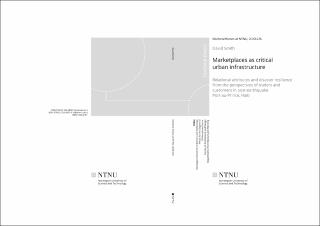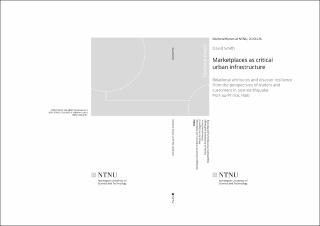| dc.contributor.author | Smith, David | |
| dc.date.accessioned | 2020-11-03T14:06:26Z | |
| dc.date.available | 2020-11-03T14:06:26Z | |
| dc.date.issued | 2020 | |
| dc.identifier.uri | https://hdl.handle.net/11250/2686245 | |
| dc.description.abstract | The thesis explores, in disaster and post-disaster contexts, the ways marketplace infrastructure support (and should support) trade for traders and customers in the metropolitan area of Port-au-Prince, Haiti, as well as other cities in low- and middle-income countries. It argues that marketplaces should be considered one of the most important urban infrastructures in these cities, particularly in disaster and post-disaster contexts. Acknowledging marketplaces as an important urban infrastructure has particular implications for urban resilience, including the critical functions and attributes of infrastructure that should be maintained during crises. Exploring these aspects is necessary due to the lack of knowledge about the functions and relational attributes of marketplaces and the infrastructural needs of traders and customers in these contexts.
The research combines two theoretical approaches that are used infrequently in research on marketplaces. The first approach conceptualises marketplaces as an urban infrastructure where the functions and attributes of both its physical and socio-economic dimensions are relational. The second approach builds on the concept of disaster resilience to explore these infrastructural aspects for traders and customers in disaster contexts: firstly the desired functions and attributes of marketplace infrastructure to be maintained or rapidly restored, secondly the influence of such marketplace infrastructure on the impact of disasters, and thirdly its influence on traders’ and customers’ resilience process.
This publication-based thesis relies on a literature review and a multiple-case study approach to explore marketplace resilience in the recent literature on marketplaces in the cities of low- and middle-income countries and in four marketplaces of Port-au-Prince, Haiti. These Haitian marketplaces present distinct infrastructural characteristics and have been unequally affected by the 2010 earthquake: the Iron Market, Lalue, Canapé-Vert, and La Coupe. Qualitative and quantitative data, mostly collected during interviews with traders and customers, were analysed to produce an overview of the marketplace infrastructure’s desired functions and attributes for traders and customers, as well as the negative effects of its collapse and deficiency in disaster and post-disaster contexts.
Based on the papers’ findings, the thesis suggests that in addition to being the location of the main source of household income and the preferred source of basic commodities for a large part of the urban population, marketplace infrastructure features five attributes that are desired to be maintained or restored rapidly in disaster contexts: solidarity, reciprocity, proximity, stability and security. These attributes, based on the physical and socioeconomic dimensions of marketplace infrastructure, benefit both traders and customers and contribute to facilitating and sustaining trade. Due to the interconnectedness of these functions and attributes, the thesis finds that trade in marketplaces can be hindered due to the failure of marketplace infrastructure to provide stability and security in disaster contexts.
The thesis ends by calling for more research on marketplace infrastructure in Haitian cities and other cities in low- and middle-income countries. In architecture, urban planning and humanitarian practice, it advocates for building on marketplace infrastructure more effectively, with the aim to stabilise and secure their desired functions and attributes for traders and customers in and after urban disasters. | en_US |
| dc.language.iso | eng | en_US |
| dc.publisher | NTNU | en_US |
| dc.relation.ispartofseries | Doctoral theses at NTNU, 2020:226 | |
| dc.relation.haspart | Essay: Smith, David. Petty trade and the private sector in urban reconstruction: learning from Haiti’s post-earthquake Iron Market. I: Urban Disaster Resilience: New Dimensions from International Practice in the Built Environment. Routledge 2016 ISBN 9781138849631. s. 157-171
https://doi.org/10.4324/9781315725420 | en_US |
| dc.relation.haspart | Paper A: Smith, David. Towards marketplace resilience: learning from trader, customer and household studies in African, Asian and Latin American cities. International Journal of Urban Sustainable Development 2019
https://doi.org/10.1080/19463138.2019.1666851 | en_US |
| dc.relation.haspart | Paper B: Smith, David. The relational attributes of marketplaces in post-earthquake Port-au-Prince, Haiti. Environment & Urbanization 2019 ;Volum 31.(2) s. 497-516
https://doi.org/10.1177/0956247819865701 | en_US |
| dc.relation.haspart | Paper C: Smith D. A risky business: the impacts of hazards on traders located in different marketplaces in Port-au-Prince, Haiti. Conference proceedings of the 8th International Conference on Building Resilience (ICBR 2018): Risk and Resilience in practice: Vulnerabilities, Displaced People, Local Communities and Heritage, 14-16 November 2018, Lisbon, Portugal. | en_US |
| dc.relation.haspart | Paper D: Smith D. Unpacking an urban domino effect: marketplace infrastructure, traders, and resilience following the 2010 earthquake in Port-au-Prince, Haiti. | en_US |
| dc.title | Marketplaces as critical urban infrastructure: Relational attributes and disaster resilience from the perspectives of traders and customers in post-earthquake Port-au-Prince, Haiti | en_US |
| dc.type | Doctoral thesis | en_US |
| dc.subject.nsi | VDP::Humanities: 000::Architecture and design: 140 | en_US |

